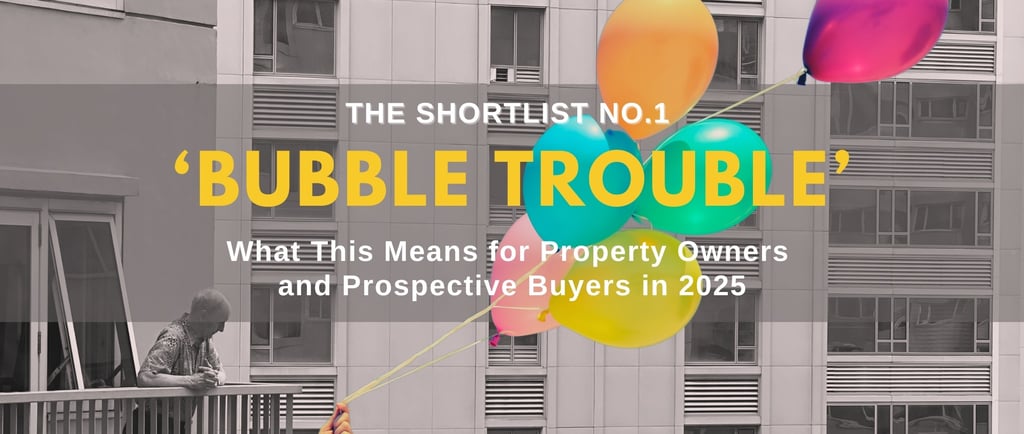The Bubble Trouble—and What This Means for Property Owners and Buyers.
Is Metro Manila’s property market on the brink, or simply entering a new cycle? In this deep dive, I unpack the fears around oversupply, a quick take on the POGO exit, and market slowdown—while offering a grounded perspective on what this all really means for owners, buyers, and investors. If you’re navigating the noise, this read brings clarity, context, and direction.
Ralph Ocampo, REB
1/7/20245 分読む


“Metro Manila condo oversupply now equivalent to 34 months”
“Property prices seen declining in Metro Manila”
“This property bubble is waiting to burst, and it is bad for investors and property owners"
There’s so much noise in the Philippine Real Estate Industry – from reputable news outlets, credible property owners and vloggers, up to a few foreign travel influencers who have little to no experience of owning real estate in the Philippines. When the news broke out and each article was published every single day, it has triggered concerning market responses from property owners and soon-to-be property buyers alike.
Now don’t get me wrong. I am a property owner myself and the current landscape of real estate bothers me as well – not only as a property owner but to a greater extent (I will not deny) as a Real Estate Broker focusing on the area of frightful concern, the greater cities of Metro Manila.
From the root to the fruit.
There are numerous speculations; one leading to the other that would link primarily the Philippine Offshore Gaming Operators (POGO) industry and the aggressive upscaling (both in property prices and features) of property developments from notable developers in the country. Real estate research firms would strongly agree that vacancies and the slowdown of real estate demand are partly due to the exit of the POGO industry.
A lot of speculators - buyers, sellers, landlords, lessors, and even real estate practitioners believe that the POGO industry started in 2016. But let’s dig in deeper. “Googol it.” as colleague uttered yesterday during our management committee meeting. A few specific keywords here, a few clicks there, and it will show you that the POGO industry started silently in as early as 2003. It was only in 2016 when the then-current President granted leniency on gambling policies to boost government revenues and create jobs for Filipinos
It was fruitful until it was too ripe for the taking.
I started my real estate career in 2014 as a real estate agent in one of the country’s oldest and flagship real estate brands and my clients were primarily local purchasers with a few residing overseas. I saw how fast paced and successful the industry was. It was growing, booming, and at one point, this sector - next to construction and utilities contributed to making the country the "Rising Tiger of Asia." The Philippines was an interesting choice of address and for business which then attracted foreign investors coupled with Chinese locators and “bulk” buyers. The pre-selling property demand was so high– both local and foreign that price increases were consistent and had always been attributed to “capital appreciation” building up to a net profit when its due. It was the perfect recipe for success that was mutually agreed upon by buyers and sellers.
Property prices were soaring high. There was capital appreciation but there was no cap (pun intended).
Market confidence is low.
Round 1. The pandemic happened – everyone was rattled. We slowly recovered.
Round 2. As early as the second half of 2024, our current President announced banning all POGO operations and business-related activities due to its links in human trafficking, drugs, and other nefarious activities that took a downward turn. This lead us to assess whether the benefits really do outweigh the consequences. It did not. This ban took effect and should have ceased all POGO operations in December 2024.
Bubble Trouble in Metro Manila
In real estate, regardless of what country you reside in, you will often hear the term “bubble”. Here in the Philippines, the word is often misused, misconstrued, and has always been linked ONLY to oversupply of inventories. This is where research is very critical. The documentary “Inside Job” is one of the best films I have seen – it is informational, research-based, factual and yet entertaining. The movie revolves around the global financial crisis of 2008 and the building blocks of a disaster waiting to happen. That includes one of the biggest housing market crash in history which was primarily triggered by “predatory” mortgage lending of sub-prime loans, unregulated financial markets, huge amounts of corporate and consumer debts and so on.
Time Check - 1:149 AM
You see, there are so many considerations and it takes more than an “oversupply” in 1 of the 149 cities in the Philippines to burst a bubble in the whole country. It is too early to conclude.
Slowdown In Real Estate Market
There will be as it did years ago, decades ago – this is only a cycle. Electricity rates and gas prices get a price hike. So do consumer goods, construction supplies, and the stock market but these don’t mean everything crashes all at once because these macroeconomic factors have safeguards to ensure that everything will revert to normal when it is due. Take note that as early as 2015, there already were rumors of the Philippine housing market crashing and nine years later we have yet to see where the current situation leads us.
Challenges in the perspective of a real estate broker
Slow down in real estate transactions – both in sales and leasing
Too many inventories mean more competition. Also, a shift in the type of property to acquire; For example: from acquiring commercial or industrial properties instead of residential properties which are more costly
Future-proofing the housing market and regaining customer confidence. Currently, some buyers are waiting for a further decline of property prices which is not likely to happen especially in the high-end to luxury markets.
Positives in the perspective of a real estate broker
Interest rate cuts from the Banko Sentral mean more borrowing power and consumer spending. Low mortgage rates may attract future property buyers to invest in properties to hedge against future inflation.
High inventory means we have entered a buyer’s market – for cash liquid buyers, there are more options to choose from and developers have more reason to relax their payment terms.
Unlike the ‘affordability crisis’ in the previous years where rental costs were too much such as those seen in the Bay area, Bonifacio Global City, and Makati City, Rental and Purchase Rates will reset and in turn will be more viable to a wider pool of local investors, buyers, and locators.
Purchasing real estate has always been a good hedge against inflation - it appreciates in value, it is tangible, it will stand the test of time and can be transferred to your heirs and beneficiaries. Regardless of whether you sell your property or not, in the end, this is a purchase that you can live with, live in, and utilize.
Conclusion
The speculations of ‘bubble trouble’ have winded consumer confidence in the office and residential sectors of real estate. It is worth noting that several key factors affect the decline of an economic sector, and one trigger alone does not necessarily collapse a market. While some fear of the “decline” as headlined by news outlets, we have yet to see tangible examples of properties declining in value especially pre-selling or inventory units from developers. It will be unjust to suddenly offer the same residential properties sold yesterday at a discount and to adapt, developers become lenient and become more considerate with their payment terms. Lowering of prices may be true but we have experienced this more in the resale market where prices are easily adjusted by sellers who rely on inquiries or comparable transactions. We have seen real estate prices in Metro Manila and its neighboring cities go up and at times, be compared to properties prices in Canada and the United States. Maybe it is time to face the reality that emerging business districts should be viable options for homebuyers and locators. Or if not, find other types of real estate-related investments such as golf and club shares, venture into landbanking, leisure-inspired properties outside the city, and real estate investment trusts (REITs). Location is very important and as long as proper infrastructures are in place, price, to a certain degree, will only be a figure. The value that you see in your current and future property will still determine your idea of “real” real estate.
Cheers,
The Shortlist by ROCA


The Shortlist by Ralph Ocampo, REBL 0033206
© 2025 Copyright. All rights reserved.